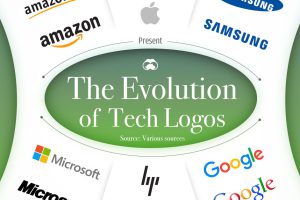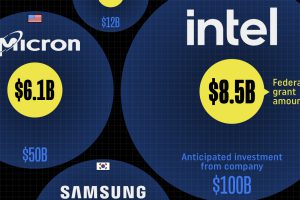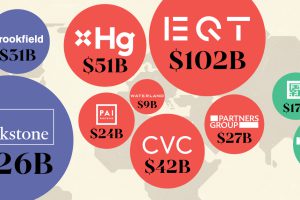iPhone Now Makes Up the Majority of U.S. Smartphones
One of the most iconic tech moments of the 21st century is Steve Jobs, in his signature black turtleneck, holding up a small device: the iPhone. Since that introduction at the 2007 Macworld conference in San Francisco, iPhone has gone on to become a global phenomenon, with over 1.2 billion units now sold around the world.
Today, the smartphone market is a fiercely competitive space.
On a global scale, iPhone has carved out a respectable 16% of the smartphone market. In the U.S., however, the iPhone has managed to win the hearts and minds of more consumers. New data from Counterpoint Research via FT notes that iPhones now make up 50% of the overall installed user base* in the United States.
With a plethora of smartphone brands available to American consumers—and many at lower price points—what is it that makes this brand so popular?
iPhone: The Apple of America’s Eye
Experts point to a number of reasons why Apple’s flagship device outperforms in the U.S. compared to other markets.
- Apple has the highest brand loyalty of any major smartphone maker. 9 in 10 U.S. iPhone users plan to purchase an iPhone as their next device.
- iPhones appear to depreciate at a slower rate than other devices
- Broadly speaking, consumers in the U.S. have less price sensitivity than consumers in many other countries.
- Apple has been vocal in their messaging about protecting user privacy and data, and that message appears to be resonating with consumers.
This last point is worth digging into in more detail.
Winning the Privacy War
Personal data protection and cybersecurity have become mainstream concerns in recent years, and Apple has made security a priority.
Of course, security breaches can and do occur, regardless of what device is being used. That said, a recent survey by Beyond Identity indicates that iPhone users were less likely to be victims of security breaches, and were more likely to recover data in the event of a breach.

The survey also points out that iPhone users were less likely to have sensitive data, such as images and videos, credit card information, passwords, and personal data compromised when breaches occurred.
These findings aside, Apple has also been bullish on branding its devices as safe and secure. The “Privacy. That’s iPhone.” campaign launched in 2019, and most recently, Apple has put the data broker industry in its crosshairs through a new series of ad spots.
Simply put: whether or not iPhone is more secure than other devices, Apple has used its marketing muscle to sway public opinion at a time when Americans are focused on privacy. And based on these latest installed user base numbers, that strategy appears to be paying off.





